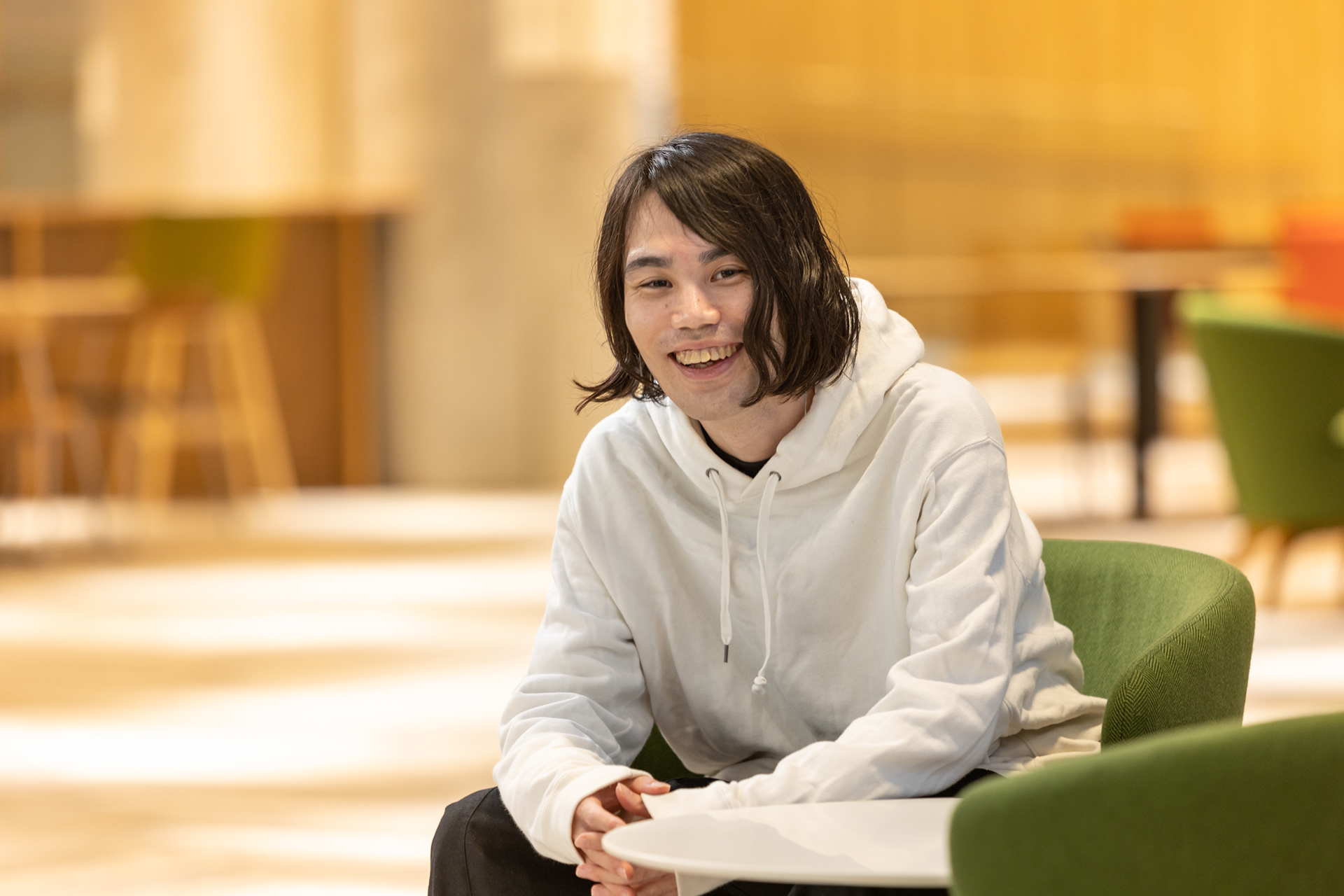While studying at Meijo University, I was part of the Virtual Reality (VR) research lab. In my fourth year, I advanced to the finals of the 24th International Collegiate Virtual Reality Contest (IVRC 2016) and received a sponsor company award. I further deepened my studies in graduate school and joined Ateam Inc. in 2019, where I am involved in developing smartphone games as a game programmer.
Discovering “Haptic VR” and Pursuing Further Studies in Graduate School
 I’ve loved games for as long as I can remember, and by the time I graduated from junior high school, I knew I wanted to work in game development. I thought that if I could learn how to program, I could get involved in game creation, so I started teaching myself how to program by searching the internet. Naturally, I chose the Department of Information Engineering, where I could study programming, for my further education.
I’ve loved games for as long as I can remember, and by the time I graduated from junior high school, I knew I wanted to work in game development. I thought that if I could learn how to program, I could get involved in game creation, so I started teaching myself how to program by searching the internet. Naturally, I chose the Department of Information Engineering, where I could study programming, for my further education.
During my first and second years, the focus was mainly on theoretical classes, so to be honest, I found it hard to stay interested in the lectures. However, that changed when I was assigned to Professor Yanagida’s lab in my fourth year and experienced haptic VR. Up until then, I had always thought of VR as something you experience visually by wearing goggles, but I was fascinated by the idea of being able to experience touch in a virtual environment as well. As I began working on actual projects, such as participating in the International Collegiate Virtual Reality Contest (IVRC), I developed a desire to dive deeper into VR, which led me to pursue graduate studies.
In graduate school, I was involved in research on VR systems that allow users to feel the texture of fabrics, as well as systems that enable users to experience the sensation of touch even while wearing gloves, just as if they were using their bare hands. The latter was a collaborative project with a research lab from another university, which also taught me the importance of communication.
Listening to User Feedback to Create Better Games
 Currently, as a game programmer at Ateam, I am involved in the operation of smartphone games and the development of new features. The game I am currently responsible for is a long-standing title with many loyal fans. When a game planner suggests, “We’d like to add this feature,” I first check whether it’s feasible within the specifications of smartphones, then handle the actual programming and evaluate whether the feature functions without any issues.
Currently, as a game programmer at Ateam, I am involved in the operation of smartphone games and the development of new features. The game I am currently responsible for is a long-standing title with many loyal fans. When a game planner suggests, “We’d like to add this feature,” I first check whether it’s feasible within the specifications of smartphones, then handle the actual programming and evaluate whether the feature functions without any issues.
While my work isn’t directly related to my graduate research theme of “VR,” the general skills I gained from working with various programming languages are proving useful. Additionally, the experience of managing multiple research projects simultaneously is helping me in my current role, where I often have to handle several tasks at once.
I find it most rewarding when a feature I implemented is released, and wereceive positive comments or reactions from users. Right after releasing a new feature, I frequently check social media, and it’s always gratifying to see posts like “This feature is so convenient!” or “The new addition is great!” On the other hand, I also value negative feedback from users. Often, such comments point to issues or bugs, and I see it as my responsibility to address these problems and ensure that users can enjoy the game even more. It’s not just me—our entire company is committed to engaging with users sincerely and working to provide better services.
Aiming to Become a Programmer Who Can Lead Development Teams
 Programmers need to keep learning in order to grow. I am always mindful of how I can improve the speed and efficiency of my programming. Since many programmers work on a single game, I also make an effort to write code that is easy for others to understand, not just for myself.
Programmers need to keep learning in order to grow. I am always mindful of how I can improve the speed and efficiency of my programming. Since many programmers work on a single game, I also make an effort to write code that is easy for others to understand, not just for myself.
The COVID-19 pandemic made me realize the importance of communication once again. When working in the office, I could easily check with other employees if I had questions, but after switching to remote work, it became more common for misunderstandings between programmers to occur, sometimes leading to the need to rewrite code. Since then, I’ve made it a point to maintain communication, using chat or video calls even for small matters.
Currently, I am learning the ins and outs of managing long-standing games that continue to be loved by many. Outside of work, I also strive to improve my skills, and my next goal is to get involved in developing new games. I want to create games with excellent playability that satisfy all players and eventually become someone who can lead a development team.
[Interview Date] January 22, 2021

